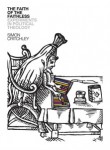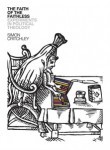In our present context, it is easy to see why, even in the Church, such a manner of life, in which possessions were held in common, as is described in Acts 4 would be greeted with as much scorn and ridicule as if one had suggested the normalization of pedophilia.
We are certainly in the sticks’, she said, looking out the window of the rail motor taking us from Dresden to Löbau, deep in the southeast of Germany, close by the Czech and Polish borders. Through the darkness, through heavy snow swirling about in the strong wind, the rail motor seemed to be cutting its way through a blanket. Ahead, its headlight barely made out the way ahead; behind it, a cloud of snow billowed in its passing. Inside, a rotund man dug a piece of those omnipresent German sausages from the back of teeth, farted and burped and settled in for the ride. At Löbau, we were the only ones to disembark, slipping on the ice of a platform that showed little evidence of salt, gravel or snow shovel. From here it was to be the last bus of the night, so we waited at the bus stop with chattering teeth, hoping the driver had not decided to stay in his warm home, or that he had not slid off the road on an icy corner on his way to pick us up….
In the end, John 3 presents a very troubling political and theological landscape: there is us and there is them, and them are where they are because they hate what we stand for. The warm and fuzzy feeling that is generally associated with John 3:16 can only be maintained if one stops reading right there. It gets scary and divisive and not very loving thereafter.
The principle of subsidiarity is perhaps one of the most crucial and most misunderstood in Catholic social teaching. According to the principle, decisions should be made at the lowest level possible and the highest level necessary. Subsidiarity is crucial because it has applications in just about every aspect of moral life. In medical ethics, subsidiarity helps guide decision-making. In social ethics, subsidiarity helps us prudentially judge not only decision-making but allocation of resources. Subsidiarity is an effort at balancing the many necessary levels of society – and at its best, the principle of subsidiarity navigates the allocation of resources by higher levels of society to support engagement and decision making by the lower levels. Despite how often it is stated – subsidiarity does NOT mean smaller is better.
The recent blogs relating to Radical Orthodoxy and its differences from the work of the William Temple Foundation appear to have ground to a halt. This is a pity as they were just about to get beyond the realms of intellectual points scoring and into some serious debate. An angle that had yet to be pursued was that of the former’s advocacy of localism and how that might be operationalised in the UK context where the current administration is keen to promote this as a policy initiative. As someone who through parochial ministry, has been eager to operate at a local level and been involved in various community work projects, I feel that I have a powerful stake in this debate (examples of this are to be found in my Local Theology: Church and Community in Dialogue, 1994, and again in Blurred Encounters: A Reasoned Practice of Faith, 2005). So when I read that there should be a renewed interest in and support for church-based projects that are indeed locally based and developed, I would have to say that I am broadly in agreement. My problem, however, is that it is difficult to see how this can be operationalised given the current pressure upon local voluntary resources, and that it fails to take into account the reality of many local issues.

Simon’s book, The Faith of the Faithless: Experiments in Political Theology must be read as throwing down a great risk. Simon enters into the theological and the political domain in ways that are offensive to how these very terms have been shaped in order to stifle action, subjectivity, and even faith itself in the very name of the political and the theological.
A few radical thinkers have recently risked thinking otherwise about theology and the political. But for the most part professors (especially in the context of America) have not been willing to risk thinking otherwise about religion and the political for reasons that can only be explained by how much academic speak has been policed by the assumption that the student is little more than a passive consumer in need of placation through reinforcing their unconscious assumptions (conservative or liberal) in the pretension of being “critical” and “objective.”

Critchley’s new cookbook for experimentation with quasi-, proto-, or post- political forms of association is compelling, often beautiful. Indeed, one cannot help but be struck by the way such good writing, such clear formulations, of our contemporary political scene have emerged under the rubric of the theologico-political (assuming here that alongside Critchley’s book we could also name Paul Kahn’s Political Theology, Giorgio Agamben’s Power and the Glory, and Eric Santner’s Royal Remains, all important figures in my little pantheon of ‘where we are today’). And while this clustering of such forceful cultural diagnoses under the aegis of political theology for me still feels surprising, maybe this surprise is just the point, an indication of a form of sensibility that has not yet become common, tired, worn out. In any case, this is a surprise worth reflecting on in the sense that we could wonder aloud about why it is that– at this particular moment in time– an attention to the theologico-political seems to focus very directly and illuminatingly on those contemporary paradoxes, deadlocks, or experiences of what Boris Groys explores so provocatively in his Communist Postscript as being oddly “stuck” in and with the problem of the common and the shareable.
“Baptism…now saves you…through the resurrection of Jesus Christ, who has gone into heaven, and is at the right hand of God, with angels, authorities, and powers made subject to him.” (1 Peter 3:22)
Aside from winning awards for the number of clauses in a single sentence (and the Greek sentence actually begins before verse 21), today’s epistle reading makes big claims! God has made all powers subject to Jesus Christ! But “all” is a big term, especially in a world that doesn’t always feel subject to God. And so the question that lingers today is, “What did the author of 1 Peter mean by “angels, authorities, and powers?”